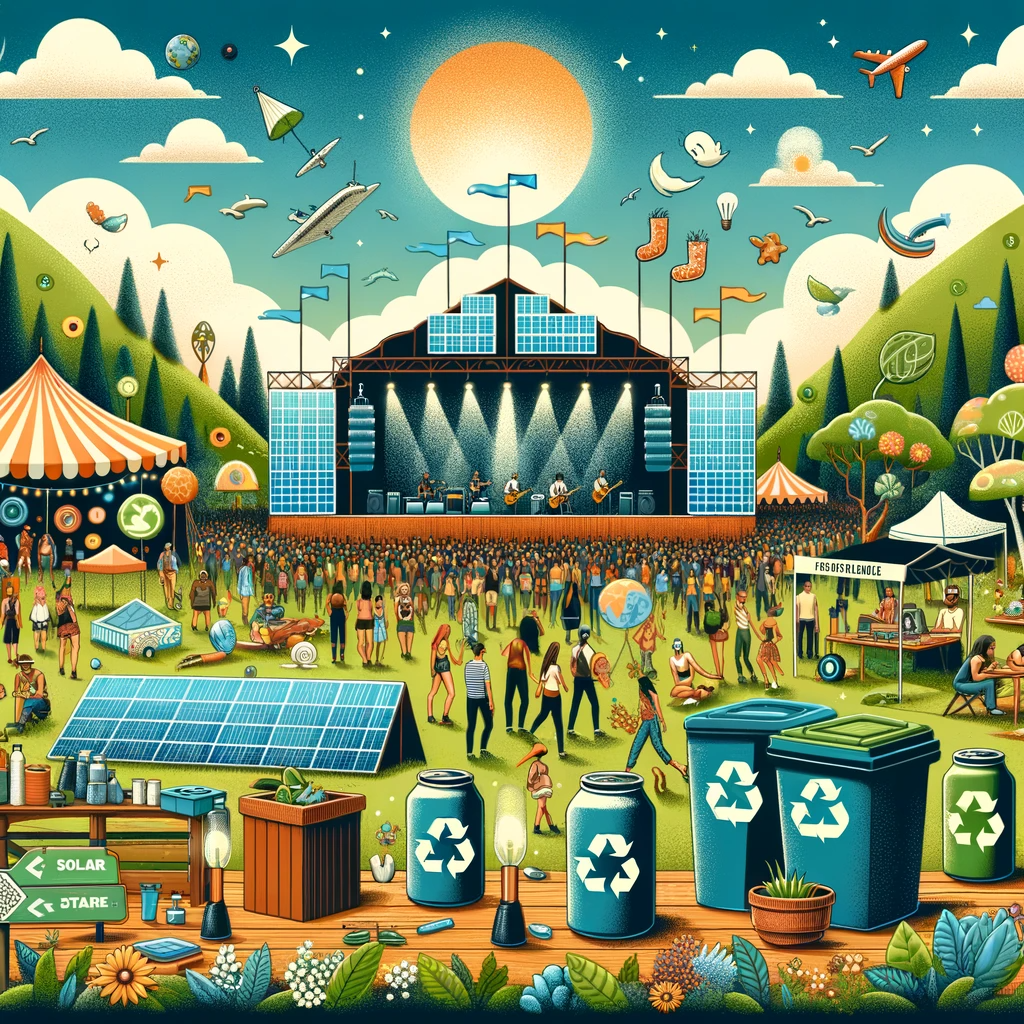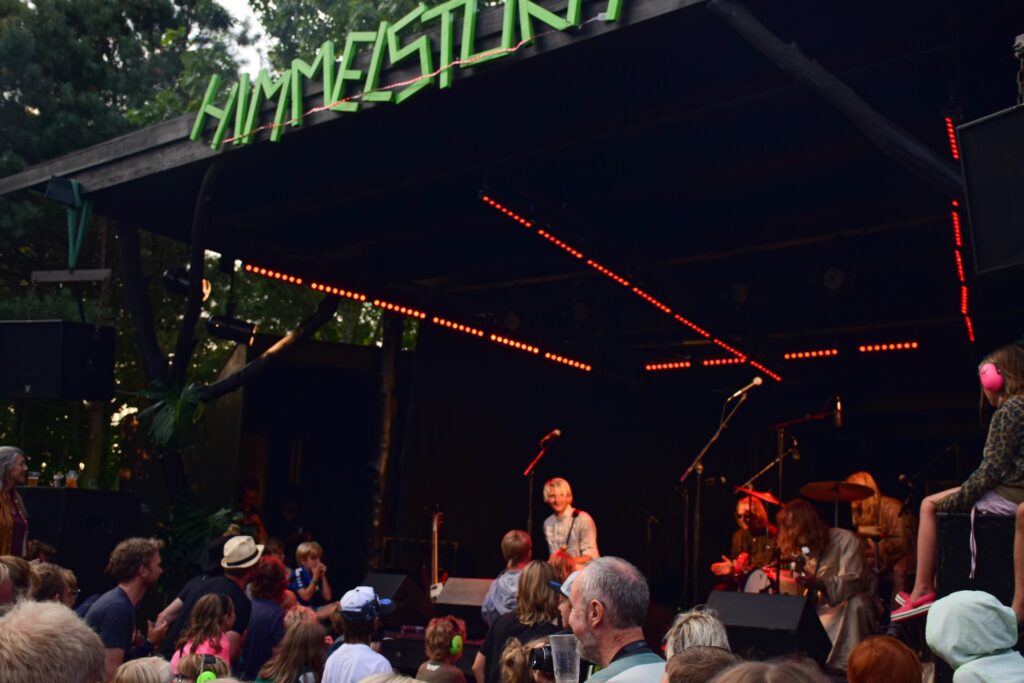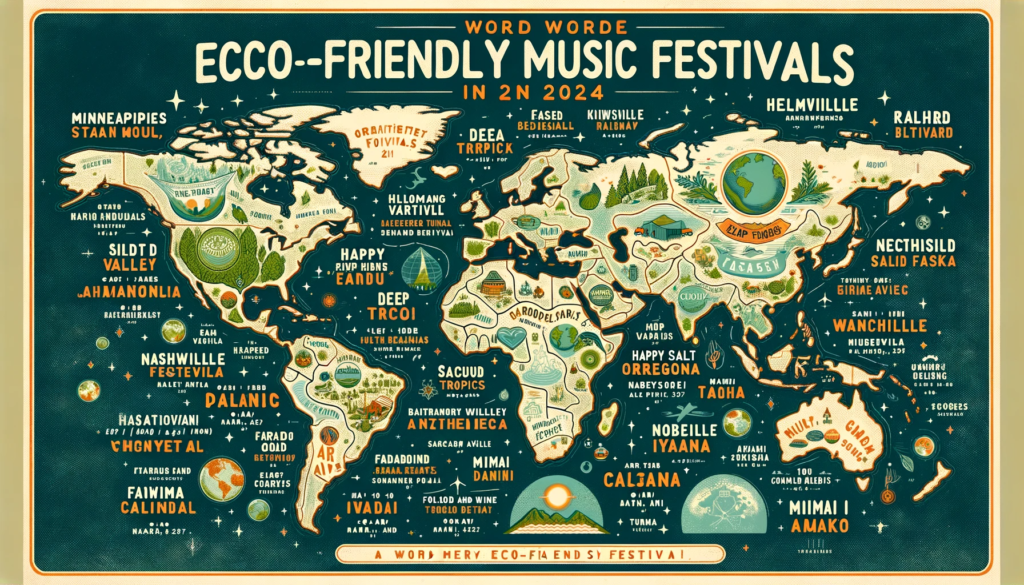Introduction to Eco-Friendly Music Festivals
In an era where environmental consciousness is not just a trend but a necessity, the music festival scene is experiencing a significant transformation. Eco-friendly music festivals are emerging as a harmonious blend of entertainment and sustainability, catering to a growing demographic of environmentally conscious music lovers. These festivals aren’t just about showcasing talent; they’re about making a statement – that fun and responsibility to our planet can coexist.
What exactly makes a music festival eco-friendly? It’s not just about minimizing waste or using renewable energy; it’s a holistic approach towards sustainability. These festivals integrate environmentally conscious practices in every aspect, from sourcing local and organic food, using biodegradable materials, to ensuring that their carbon footprint is as minimal as possible. The objective is clear – to provide a platform for artists and attendees to celebrate music while respecting and protecting the environment.
The significance of this growing trend can’t be overstated. As the world grapples with climate change and environmental degradation, eco-friendly music festivals serve as a beacon of hope and innovation. They prove that large-scale events can be both entertaining and environmentally responsible. These festivals are not just events; they’re part of a larger movement towards a more sustainable and conscientious way of living.
As we dive into the world of eco-friendly music festivals, we’ll explore some of the most notable examples from around the globe, examine their impact, and discuss how attendees can contribute to this green revolution. The future of music festivals is here, and it’s greener than ever. Join us on this journey to discover how these festivals are not only rocking the world but also saving it.

Spotlight on Notable Eco-Friendly Festivals
1. Introduction to Eco-Friendly Festivals
Eco-friendly music festivals are more than just musical gatherings; they are a celebration of sustainable living and environmental stewardship. These events are characterized by their commitment to reducing environmental impact through innovative practices. From the use of solar panels to power stages to zero-waste policies and water conservation efforts, each festival brings its unique approach to sustainability.
2. Examples of Eco-Friendly Music Festivals
Around the world, several festivals have set the standard for eco-friendly practices. For instance, the Shambhala Music Festival in Canada is known for its extensive recycling programs and use of biodegradable materials. In Europe, the Boom Festival in Portugal stands out for its integrated environmental policies, including the use of renewable energy and sustainable water management systems. These festivals not only entertain but also educate attendees about the importance of environmental conservation.
3. Incorporating Sustainability
What sets these festivals apart is their holistic approach to sustainability. This includes:
- Energy Use: Utilizing renewable energy sources like solar and wind power.
- Waste Management: Implementing comprehensive recycling and composting programs.
- Water Conservation: Using water efficiently and encouraging attendees to do the same.
- Eco-Friendly Transportation: Promoting carpooling, biking, or using public transportation to reduce the carbon footprint.
- Sustainable Merchandise: Offering merchandise made from sustainable materials and encouraging a culture of reuse.
4. Impact Beyond Music
These festivals create a ripple effect, influencing attendees to adopt more sustainable lifestyles in their daily lives. They also set a precedent for other large-scale events, proving that sustainability can be successfully integrated into any event without compromising on quality or experience.
5. Challenges and Innovations
Despite their many successes, eco-friendly music festivals face challenges, such as balancing the high costs of sustainable technologies and managing the large crowds in an environmentally friendly manner. However, these challenges are met with innovative solutions that continue to evolve the landscape of sustainable events.

The Impact of Eco-Friendly Practices
1. Environmental Benefits
The most direct impact of eco-friendly music festivals is on the environment. By using renewable energy sources, these festivals significantly reduce their carbon footprint. Waste reduction strategies, such as recycling and composting, minimize the amount of waste sent to landfills. Water conservation efforts help preserve this vital resource, and the use of biodegradable materials reduces pollution.
2. Social and Cultural Impact
Eco-friendly festivals also have a profound social and cultural impact. They serve as educational platforms, raising awareness about environmental issues and inspiring attendees to adopt more sustainable practices in their daily lives. These festivals foster a sense of community and shared responsibility towards the planet, creating a culture of sustainability that extends beyond the event itself.
3. Economic Implications
Sustainable festivals can also positively impact the local economy. They often involve local vendors and suppliers, promoting local businesses and products. The push for sustainability can also drive innovation, leading to the development of new eco-friendly technologies and practices that have broader applications.
4. Comparative Analysis with Traditional Festivals
When compared to traditional music festivals, eco-friendly events demonstrate a significant reduction in environmental damage. Traditional festivals often rely heavily on non-renewable energy sources, generate substantial waste, and have a larger overall carbon footprint. The contrast underscores the importance and effectiveness of sustainable practices in large-scale events.
5. Case Studies: Success Stories
Several case studies highlight the success of eco-friendly music festivals. For instance, festivals like Glastonbury in the UK have implemented extensive recycling programs and reduced plastic use, setting a benchmark for others. These success stories provide valuable lessons and a roadmap for organizing sustainable events.

The Role of Attendees in Promoting Sustainability
1. Personal Responsibility
The role of festival-goers in promoting sustainability is crucial. Attendees can make a difference by adhering to the festival’s environmental policies, such as properly disposing of waste and minimizing their carbon footprint.
2. Sustainable Travel Choices
One of the key areas where attendees can contribute is in their travel choices. Opting for public transport, carpooling, or using bicycles can significantly reduce the environmental impact associated with traveling to and from the festival.
3. Eco-Conscious Behavior at the Festival
Once at the festival, attendees can continue their eco-conscious behavior by using reusable water bottles, supporting eco-friendly vendors, and engaging in environmental initiatives offered by the festival.
4. Spreading the Word
Attendees also play a vital role in spreading awareness. By sharing their experiences and the sustainable practices they observed at the festival, they can influence others and promote a culture of environmental responsibility.
5. Continuing the Effort Beyond the Festival
The impact of a sustainable festival doesn’t have to end with the event. Attendees can take the lessons learned and the habits formed at the festival and integrate them into their daily lives, furthering the cause of sustainability.

The Impact of Eco-Friendly Practices
1. Environmental Benefits
The most direct impact of eco-friendly music festivals is on the environment. By using renewable energy sources, these festivals significantly reduce their carbon footprint. Waste reduction strategies, such as recycling and composting, minimize the amount of waste sent to landfills. Water conservation efforts help preserve this vital resource, and the use of biodegradable materials reduces pollution.
2. Social and Cultural Impact
Eco-friendly festivals also have a profound social and cultural impact. They serve as educational platforms, raising awareness about environmental issues and inspiring attendees to adopt more sustainable practices in their daily lives. These festivals foster a sense of community and shared responsibility towards the planet, creating a culture of sustainability that extends beyond the event itself.
3. Economic Implications
Sustainable festivals can also positively impact the local economy. They often involve local vendors and suppliers, promoting local businesses and products. The push for sustainability can also drive innovation, leading to the development of new eco-friendly technologies and practices that have broader applications.
4. Comparative Analysis with Traditional Festivals
When compared to traditional music festivals, eco-friendly events demonstrate a significant reduction in environmental damage. Traditional festivals often rely heavily on non-renewable energy sources, generate substantial waste, and have a larger overall carbon footprint. The contrast underscores the importance and effectiveness of sustainable practices in large-scale events.
5. Case Studies: Success Stories
Several case studies highlight the success of eco-friendly music festivals. For instance, festivals like Glastonbury in the UK have implemented extensive recycling programs and reduced plastic use, setting a benchmark for others. These success stories provide valuable lessons and a roadmap for organizing sustainable events.

The Future of Music Festivals and Sustainability
1. Innovations in Sustainable Festival Planning
The future of eco-friendly music festivals is bright, with numerous innovations on the horizon. Advancements in renewable energy technologies, such as more efficient solar panels and portable wind turbines, are making it easier and more cost-effective for festivals to be powered sustainably. Innovations in waste management, like advanced composting techniques and zero-waste initiatives, are becoming more widespread.
2. Digital Integration and Virtual Reality Experiences
Another exciting development is the integration of digital and virtual reality technologies. These tools can reduce the environmental impact of festivals by offering virtual attendance options, thus cutting down on travel-related emissions. They also open up new possibilities for interactive and immersive environmental education experiences within the festival setting.
3. Community and Global Collaborations
The future will likely see more collaborations between festivals, environmental organizations, and local communities. These partnerships can amplify the impact of sustainability efforts and lead to the sharing of resources and best practices on a global scale.
You Can Also Check: “Glass Animals Dreamland Tour in 2023: Things to Know“
4. Sustainability as a Core Value
Sustainability is becoming a core value in the music festival industry. More and more festivals are embedding environmental responsibility into every aspect of their planning and execution, setting a new standard for the events industry as a whole.
5. The Role of Policy and Regulation
Finally, policy and regulation will play a critical role in shaping the future of eco-friendly music festivals. Governments and regulatory bodies are beginning to recognize the importance of sustainable events and are developing guidelines and standards to support and promote these practices.
Conclusion
Eco-friendly music festivals represent a dynamic and inspiring intersection of entertainment, community, and sustainability. These events demonstrate a powerful commitment to the environment, serving as a model for other industries and communities.
As we look to the future, the continuous innovation and dedication to sustainability in the music festival industry offer hope and a roadmap for a more environmentally conscious world.
Whether through the use of renewable energy, waste reduction, or the promotion of sustainable lifestyles, these festivals are not just celebrations of music but celebrations of our planet and our collective efforts to protect it.

Recognized Eco-Friendly Music Festivals Slated for 2024:
- The Great Northern: Held in Minneapolis and Saint Paul, Minnesota from January 25 to February 4, 2024. Its mission is to communicate the importance of winter and how to protect it as temperatures rise.
- Old Salt Festival: The location and dates for 2024 are to be announced. The 2023 event was in Helmville, Montana. This festival promotes regenerative agriculture.
- Pickathon: Located in Happy Valley, Oregon, with the 2024 dates yet to be announced. The festival’s mission is to create a model of a truly green festival.
- Deep Tropics: This event is in Nashville, Tennessee, scheduled for August 16 to 17, 2024. Its mission is to show how electronic festivals can go green.
- Sacred Acre: Taking place in Ninilchik, Alaska, with 2024 dates to be announced. The festival aims to raise awareness about the dangers of bottom trawling.
- Farm Aid: The 2024 dates are to be announced, with the 2023 event held in Noblesville, Indiana. Its mission is to protect American farmers and advocate climate-resilient agricultural techniques.
- Ohana Festival: Located in Dana Point, California, with 2024 dates yet to be announced. The festival focuses on conserving the ocean environment.
- Hawaii Food and Wine Festival: Happening in Hawaii, Maui, and Oahu from October 18 to November 3, 2024, on weekends only. The festival promotes local, sustainably-sourced food in Hawaii.
- Art With Me: Taking place in Miami, Florida, and Cesme, Turkiye, with 2024 dates to be announced. This festival advances sustainability and low-waste partying.
